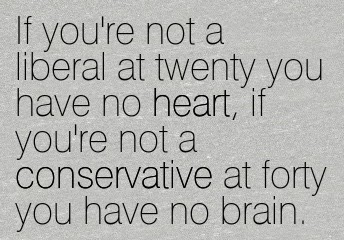I have, thus far (and surprisingly successfully), stayed almost entirely out of the 2015 Colorado Republican Chairman's race.
It's no secret that Ryan Call and I aren't exactly friendly (I am, after all, on his enemies list), and that I supported and voted for Steve House at State Assembly for Governor in 2014. Needless to say, this one is a no-brainer for me. But without a vote on March 14, it seemed unnecessary for me to step in and rehash so many old things... until now.
This past weekend was the final straw for me, and for many in the Colorado GOP. Many have continued to come back over and over to someone who has continually thumbed his nose at us, but it's time to make a clean break once and for all.
Before we do that, however, let's see what built up to this moment. Yes, it's snarky and sarcastic, but solidly based in reality (as you'll see with all the links and endnotes). Did you really expect anything else from me? At this point, the joke is on all of us—all Colorado Republicans, and we're all losing because of it. Sometimes you have to fight fire with fire. Enough is enough.
Join me (and those signed below) in breaking up with Ryan Call—and if you're bold enough, let me know and I'll add your name to this letter, too (man or woman... unlike Ryan Call, I won't discriminate based on gender).
If Call wins, Colorado loses. It's that simple.
From the Desk of
Colorado Republican Women
March 3, 2015
Our dear Chairman Ryan Call,
We’ve been together for almost 4 years now. Maybe it’s time to think about where we are at, and what we have accomplished in our relationship.
The Colorado Republican Party has made some improvements. We’re now caught up to the early 2000s in technology, as opposed to dwelling in the 1980s dark ages... so there’s that.
We applaud you for your attempt at building an infrastructure, such as it is, but with nothing there before, it’s a good place to start.
However… not everything has been so rosy.
I mean, we might have been able to overlook your $400 maxed-out contribution in 2006 to Bernie Buescher (screenshots here), a Democratic candidate, while you were Denver County Republican Party Vice Chair… if you didn’t threaten to withhold money from viable Republican candidates because they didn’t pick a company you liked to work with them on their campaign.
We could forget your lovely 2011 mug shot—from a traffic ticket you managed to forget to show up to court for… as a lawyer—if you weren’t funneling tens of thousands of Colorado Republican Committee dollars to your own law firm[1].
It would be possible to forget that you threw two Republican state legislators (Sen. Vicki Marble and Rep. Lori Saine) under the bus… if you didn't admonish the entire House and Senate Republican delegation over opposing in-state tuition for illegal aliens (in clear opposition to the Party platform[2]).
We could turn a blind eye to your pathetic and paltry support of state legislative candidates[3, 4]… if only your pet IEC hadn’t just been found guilty of violating state law on 4 counts—while you are a member of the RNC Finance Committee, and after you trumpeted on the radio that the “independent” committee was, in fact, coordinating with the Republican Party after all.
Maybe we could live with all the secrecy and non-transparency of your entire administration if you didn’t hire a convicted crook to run your new IEC. I mean… you let someone guilty of federal crimes into our home? We thought you cared more about our safety, credibility, and integrity as a Party than that.
Speaking of money… you promised us back in 2011 that we would win in November 2012, or our money back—guaranteed! Here’s what over $8 million (mostly given to you by the blood, sweat, and tears of the RNC, and not from your own shoe leather) bought us in 2012:
- A loss for Romney in Colorado.
- A loss in our only statewide election.
- No change in Congress (despite a potential pick up in at least one district).
- No change at the CU Board of Regents (when there were two potential pick-ups).
- No change at the State Board of Education (granted, with only CDs 2 and 4 up, there wasn’t going to be any change this election cycle).
- No change in the State Senate (despite two very winnable seats, and two more toss-ups).
- The largest loss in the State House, from 33R-32D to 37D-28R, since 2004—the year of The Blueprint.
Oops. That was kind of embarrassing. Let’s move on to something better, shall we? Like 2014. This past election, we saw…
- A loss for Beauprez; but wins for 3 other statewide Republicans.
- No change in Congress; but a win for Gardner.
- No change at the CU Board of Regents.
- No change at the State Board of Education.
- A 1-seat (net) gain in the State Senate (18R/17D)—could have been 3 net wins.
- A 3-seat gain in the State House (34D/31R)—could have been 6 wins.
That’s a little more positive, isn’t it? Slow clap on winning one national race while largely letting the rest of the state stay stagnant.
Look. We might be able to applaud your minimal gains for Republicans in Colorado after 2 terms and nearly $20 million dollars spent on elections[5]… if only registration for active Republicans hadn’t dropped by 5.49% under your tenure, with an overall drop of 1.29% of total registered Republicans during that time[6, 7].
And then there’s your statement on October 7, 2013 about the Senate District 19 recall (“This recall election would undermine our efforts in the governor’s race, the U.S. Senate race and to win a senate majority if voters perceive that Republicans are trying to win a majority through recalls.” [source]). Now, this we might forgive and forget if it wasn’t just so blatantly wrong—after all, we did win the U.S. Senate seat and the State Senate majority… only and entirely because this seat was up for election in 2014. This is, of course, after you opposed the ruling that made success even possible in the Senate Districts 3 and 11 recalls… and then tried to cover that up by removing the press release from your website.
Here’s the rub. There’s a lot we are willing to turn a blind eye to in the name of “unity”. There’s even a lot that we think can, and should, be kept behind closed doors.
The problem, Mr. Chairman, is that nothing ever gets resolved behind closed doors because you pretend like we don’t exist. Let’s face it. You have a very poor track record of dealing with us women. I mean, just look at the numbers:
- 4/30 female candidates in 2014 received State Party support
- 5/24 female candidates in 2012 received State Party support
- A mere 14% of funds given to candidates in 2012 and 2014 went to women, who made up almost 1/3rd of all candidates for statewide and state legislative offices
And yet, despite all that, we stayed steadfast, loyal, and true. But no more.
The final straw, Mr. Chairman, was the transparent and blatant power grab just this past weekend in Costilla County, where you chose to unseat duly elected officers and replace them with your handpicked voters. We are willing to tolerate a lot, but you finally crossed a bridge too far and we just can’t do it anymore.
We’re not asking for special treatment. We’re not even asking for the same treatment you give to men. All we want is a little bit of fair play. Is that really so much to ask?
It’s time for us to face the truth. You’ve shown that you’re not that into us.
Well… guess what? That feeling is mutual.
We’re just not that into you, either.
And no… we can’t be ‘just friends.’ We’re through.
Disaffectionately,
Colorado Republican Women
Sarah Arnold, Regan Benson, Meaghan Croghan, Sharon Croghan, Lana Fore, Mary Anne Greer, Leslie Hanks, Alexandra Harden, Judy Howell, Tina Jones Griffiths, Dorié Ann Lehan, Becky Mizel, Julie Naye, Jen Raiffie, Mailyn Salabarria, Julie Scott, Anita Stapleton, Nancy Wenlock
And the men who love Colorado Republican women...
Matt Arnold, George Athanasopoulos, Kim Herzfeld, William Howell, Simon Kane, Robert Pryor, Joe Webb
And the men who love Colorado Republican women...
Matt Arnold, George Athanasopoulos, Kim Herzfeld, William Howell, Simon Kane, Robert Pryor, Joe Webb
__________________
END NOTES
[1] $147,225.00 from 2011-current paid to Hale Westfall LLP by the Colorado Republican Committee. Search committee #C00033134.
[2] “Illegal immigrants should not receive any non-emergency benefits, services or privileges from federal, state or local governments.” [source]
[3] 28.66% of CRC funds, according to TRACER, went directly to non-federal candidates in 2012. 62.41% of CRC funds, according to TRACER, went directly to non-federal candidates in 2014—a number which drops dramatically to a mere 14.85% when you remove contributions to gubernatorial candidate Bob Beauprez. Search committee #19991500072.
[4] CRC money spent in the state of Colorado in 2012 on non-federal elections was 4.41% of the total operating budget that cycle. CRC money spent in the state of Colorado in 2014 on non-federal elections was 8.04% of the total operating budget that cycle. See notes 1 and 3 to find committee information on TRACER and FEC.
In other words, 1.21% of total CRC money was spent on non-federal candidates in 2012; and only 4.65% of total CRC money was spend on non-federal candidates in 2014… or 1.11% if you take out Beauprez’s contributions.
[5] 64 Republicans in statewide and federal office in 2011 vs. 66 Republicans in statewide and federal office in 2015 (out of 130).
[6] 38.33% active registered Republicans as of 1 April 2011, 32.69% total registered Republicans as of 1 April 2011 [source]
[7] 32.84% active registered Republicans as of 1 February 2015, 31.40% total registered Republicans as of 1 February 2015 [source]


















